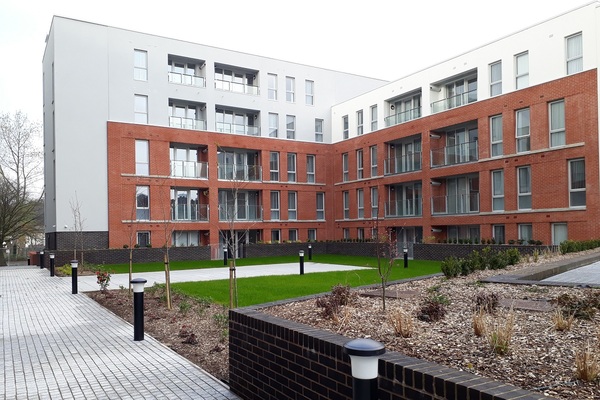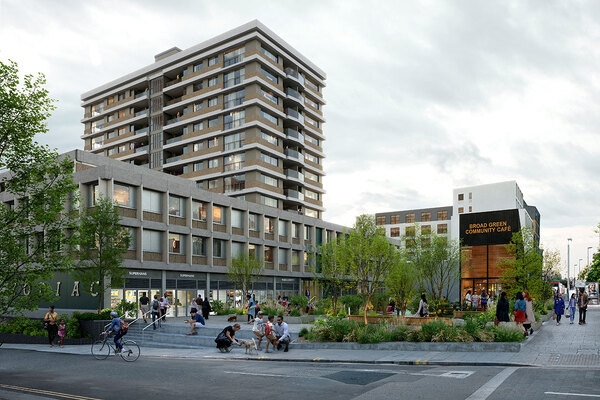You are viewing 1 of your 1 free articles
 Ben Collins
Ben CollinsWhatever the election outcome, action on Northern Ireland housing must be a priority
A lack of devolved government in the region means critical housing issues aren’t being addressed, warns Ben Collins
The outcome of the upcoming Westminster election will be especially significant in Northern Ireland where we have been without a devolved government for more than 1,000 days.
This extraordinary situation has left vital decisions unmade and stymied progress, particularly in addressing issues such as housing stress, reclassification and welfare reform mitigations.
While Brexit is a concern, these are all matters of critical importance which must be dealt with as a matter of urgency.
In the ongoing absence of a functioning Northern Ireland Executive and Northern Ireland Assembly, the responsibility for urgent action on reclassification and extending the welfare mitigations lies with the secretary of state for Northern Ireland.
Northern Ireland is the only part of the UK where the reclassification of housing associations as public sector bodies by the Office for National Statistics has not been reversed.
The relevant legislation is ready to be tabled and successive secretaries of state have undertaken to bring this forward.
HM Treasury has agreed to arrangements on a temporary basis until next March, which allow housing associations in Northern Ireland to continue to use private finance.
They are not, however, allowed to use financial transactions capital, which is a missed opportunity and impacts on the delivery of shared ownership homes.
Unless the legislation is passed or the current arrangements are extended, housing association borrowings will become public rather than private debt. This debt would be covered by Northern Ireland’s block grant, resulting in significant cuts elsewhere.
It would also mean housing associations could no longer access the private finance which allows us to build around twice as many homes as would otherwise be possible.
The current welfare mitigations which were put in place by the Northern Ireland Executive in 2016 are due to end next March.
The circumstances which led to the introduction of the mitigations have not gone away. Indeed, they have been exacerbated by the roll-out of Universal Credit.
The Northern Ireland Federation of Housing Associations (NIFHA), as a member of both the #CliffEdgeNI coalition and the Four Feds #SixAsks campaigns, is calling for the mitigations to be extended.
“Even those who have never been behind on their rent are falling into arrears, while the ability of housing associations to support tenants is constrained by the way Universal Credit has been set up”
The Northern Ireland Human Rights Commission’s recent report on the impact of tax and welfare reform echoed studies from across the UK showing that low-income families and people with disabilities are hardest hit by the changes.
Even those who have never been behind on their rent are falling into arrears, while the ability of housing associations to support tenants is constrained by the way Universal Credit has been set up.
The following measures would help prevent and alleviate such problems:
- End the five-week wait for payment which causes people to fall into debt from the start. The five-week wait is causing unnecessary hardship, a rise in food bank usage and an increase in rent arrears
- Allow more data sharing between the Department for Work and Pensions and social landlords
- Landlords need to be told in advance who is moving onto Universal Credit, so they can better support tenants and prevent problems for those struggling with payments or in need of extra assistance to make their initial claim
- Ensure that landlords receive their payments on the same cycle as their tenant
- Increase funding for support and advice
We hope that Northern Ireland will finally get government ministers appointed after the UK general election next month.
There are other issues which should be addressed by an incoming direct rule or Northern Ireland Executive minister. The number of people living in housing stress in Northern Ireland has increased by more than 20% in the past five years, so we urgently need to build more homes, not less.
The homes that housing associations deliver, with the support of the Department for Communities and the Housing Executive, provide the foundation for people and families to build better lives.
“The number of people living in housing stress in Northern Ireland has increased by more than 20% in the past five years, so we urgently need to build more homes, not less”
Construction of these homes is also a major economic driver in Northern Ireland. Building work and associated investment deliver around £1bn to the Northern Ireland economy each year. This represents a significant economic return and a key part of economic activity for the wider construction industry.
Action on the following issues will allow us to keep delivering both quality homes and value for money.
A mixed-tenure approach is crucial to creating sustainable communities. That is why NIFHA calls on central government to formalise a policy supporting mixed-tenure housing. In addition, each council’s local development plan should have an element of affordable housing, based on a definition that includes social and intermediate housing.
The following actions are also of vital importance:
- Move from the current annual Social Housing Development Programme to a multi-year programme to eliminate unnecessary constraints which put pressure and add costs to development
- Reinstate the Z clause derogation which enabled housing associations to effectively manage claims for unforeseen ground conditions with no use of public funding, on the same basis as in Britain
- Create a public sector land policy whereby a) all public sector (including local council) land is part of the asset disposal process; b) surplus public sector land is prioritised for housing where there is identified need; and c) each government department has targets for release of surplus land for social and affordable housing
NIFHA continues to lobby for these changes and we ask all voters to remind candidates of their importance.
Ben Collins, chief executive, Northern Ireland Federation of Housing Associations











